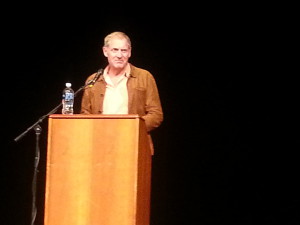
Love at first sight. (Photo: Gerry Cambridge)
Sir Andrew Motion, former British poet laureate, read Philip Larkin‘s poetry in school and “immediately fell in love with him” – fell in love with him, despite obvious differences in their poetry and outlook. Eventually, Motion became an executor following Larkin’s death in 1985, and then his biographer. His 1993 Philip Larkin: A Writer’s Life won the Whitbread Prize for Biography.
The youthful enthusiasm that became a sort of vocation left him feeling “fascinated, privileged, lucky.” Motion, currently teaching at Johns Hopkins University, told the story to an audience at the West Chester Poetry Conference last week. One of the conference founders, California poet laureate Dana Gioia, was interlocutor for the discussion.
That early affinity was part of the reason why Motion accepted an appointment at the University of Hull in 1976, when he was only 24 – Larkin was the university librarian at Hull. But proximity didn’t guarantee access. “Bad luck,” a colleague told him, explaining that Larkin hated everyone at the university, especially those who teach English. “You’ll never meet him,” he was warned.
The colleague was wrong. The encounter finally happened at the university pub. “There he was,” Motion recalled. “He looked very much like I was expecting – and not as I expected. Taller, bulkier, looming, funeral-suited.” Larkin was fatherly, downright biblical – “he was 53 coming on 153.”
“He was ten years younger than I am now, and he looked like God.”

Gioia (Photo: Gerry Cambridge)
The god-like Larkin took a huge swig of beer and it went down the wrong way. Motion began thumping him on the back. “That was an icebreaker,” he recalled. Here was another: when Motion mentioned that his father was a brewer, “Philip’s face absolutely lit up.”
While Larkin was seen as austere and forbidding, when he was among friends, “he was the most charming man, deeply funny.”
Motion was later asked to be one of Larkin’s literary executors. “I said I would do it but please would he not die,” he said. Motion also warned Larkin to discard anything he didn’t want preserved – “he was to understand I would not throw anything away.” Motion was as good as his word: he saved many of Larkin’s papers from imminent destruction after his death. (But not before his diaries were shredded, page by page.)
Motion was perfectly positioned, after the nine-year friendship, to become Larkin’s biographer. “When Philip died, his Number One girlfriend” – presumably Monica Jones – “was sitting in a chair, smoking herself to death, sozzled, with unkempt hair, and dropping ashes on the floor.” She picked up Larkin’s address book and threw it at him. “Everyone you need to talk to is there,” she said.

Reading his poetry (Photo: Anna Yin)
“He lived a very very discreet life,” said Motion. “He had lived his life in extraordinarily discrete compartments. We all do that to some extent.” All biography is a kind of invasion of the subject, however, and Motion had pangs of guilt.
“I had series of very peculiar dreams during period of writing about Larkin.” In one, Motion was speaking in an auditorium – and Larkin was sitting in the audience. Motion was remorseful in the dream, thinking, “Oh shit. I’d say none of this when he was still alive.” It was the guilt working through itself, he said.
Finally, Larkin appeared to him in a dream, with a collar made of hay. Motion interpreted that “as a vision of him saying, ‘It’s okay.’”
 When Motion was named poet laureate, following the death of his predecessor, Ted Hughes, he redefined the role from a lifetime position to ten-year term. He said this allowed consideration of younger people for the office, and brought more vigor to the role.
When Motion was named poet laureate, following the death of his predecessor, Ted Hughes, he redefined the role from a lifetime position to ten-year term. He said this allowed consideration of younger people for the office, and brought more vigor to the role.
His signal achievement was the creation of the Poetry Archive, a web-based library of English language poets reading their own work. It currently includes 400 recorded voices, and attracts 300,000 visitors a month. “I’m very proud, very pleased about the archive. It’s done a lot of good in the world,” he said.
It also refutes an argument that “come round like a sock in the washing machine” – that is, the claim that people don’t read poetry anymore. “We should probably cheer up,” he said. “More people listening to poetry than ever before, via things like archive.”
Postscript on 6/15: You may have observed that the earlier headline said “looked like a god.” I received this note from Gerry Cambridge (who took some of the photos above): “Cynthia great to meet you at West Chester. A wee observation: Andrew Motion actually said ‘… and looked like God’, not ‘…a god’. Which I think is funnier, if more risqué in some quarters.”
Tags: "Dana Gioia", Andrew Motion, Philip Larkin


June 13th, 2016 at 6:38 pm
So glad that my photo was used here!(thank you Cynthia Haven)
So glad to meet Sir Andrew Motion and talk with him, even show my translation of his poem: The Attic to him at the West Chester Poetry Conference!
Anna Yin
June 13th, 2016 at 6:40 pm
Terrific seeing you there, Anna! And thanks for letting us use your photo!
June 15th, 2016 at 7:50 am
Anna and Gerry i am a big fan of you two people.The note sent by gerry about “looked like a god ” appreciating you .You people are awesome.
Thanks for sharing your photos.